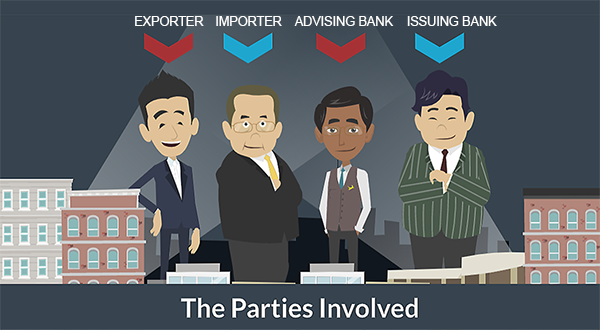1. What is the purpose of a documentary credit?
The aim of a documentary credit (also known as a letter of credit) is to reduce and, to the furthest extent possible, eliminate risk. Accordingly:
- Parties to a credit must fully understand all elements, including the terms and conditions of a credit.
- It is absolutely essential to fully appreciate UCP 600.
- A working knowledge of ISBP 745[ref] ‘International Standard Banking Practice’ ICC Publication no. 745[/ref] will help avoid most problems.
- Practitioners should keep up-to-date with market developments, which can be as simple as maintaining discussions with your peers.
2. What is UCP 600?
Documentary credits are governed by an international code of practice drawn up by the International Chamber of Commerce, known as Uniform Customs and Practice for Documentary Credits (UCP). These rules were originally introduced to alleviate the disparity between national and regional rules on documentary credit practice.
First published in 1933, and revised on five occasions since, the latest version is known as UCP 600. This comprises 39 Articles, which establish the requirements necessary to regulate documentary credit operations.
3. What is the difference between a Documentary Credit and a Letter of Credit
Both terms are in common usage and are synonymous. There is no distinction between the two but, as ICC rules commonly refer to ‘documentary credits’[ref]In particular UCP 600 and ISBP 745[/ref], this is the term used within this guide.
4. Who are the parties involved in a documentary credit?

It is essential to be aware of the parties involved in documentary credit transactions, a brief summary of which follows:[ref]UCP 600 Article 2 Definitions[/ref]
- Applicant: the party on whose request the credit is issued (the buyer)
- Issuing Bank: the bank that issues a credit at the request of an applicant or on its own behalf.
- Advising Bank: the bank that advises the credit at the request of the issuing bank.
- Confirming Bank: the bank that adds its confirmation to a credit, in addition to that of the issuing bank, to honour or negotiate a complying presentation (see question 7).
- Nominated Bank: the bank with which the credit is available or any bank in the case it is available with any bank.
- Beneficiary: the party in whose favour the credit is issued and normally the provider of the goods, services or performance (the seller)
5. What is good practice for dealing with documentary credits?
Applicant (buyer) must observe three rules:
- Instructions to the issuing bank must be clear, precise, correct and free from excessive details.
- The purpose of the credit is to pay for the goods and not to police the transaction.
- The credit should not call for documents that the seller cannot provide nor set out conditions that the seller cannot meet.
Upon receipt of a documentary credit, the beneficiary (seller) should check, (among other things):
-
- Can the goods be shipped from the stated port of loading to the stated port of discharge?
- Are the merchandise and unit prices correct?
- Is the amount of the credit correct?
- Are the contract terms correctly covered by the credit?
- Can the required documents be obtained in the required form?
- Are names and addresses correct?
- Do the shipment and expiry dates allow enough time to ship the goods and prepare the required documents?
Further Learning: If documentary credits are a tool you need to use regularly in your job, consider taking one of our internationally recognised trade finance courses and qualifications to bring your knowledge and skills up to ICC-endorsed, global standards. You can choose to focus specifically on documentary credits over a single course at an introductory or advanced level or earn a broader trade finance qualification like our Global Trade Certificate (introductory) or Certified Trade Finance Professional (CTFP) (advanced) that both include courses on documentary credits as part of a wider curriculum that also covers other trade finance techniques.
6. What are the common discrepancies found in documentary credits?
It is estimated that anything between 65% and 75% of presentations, upon which the documentary credit depends, are refused on first presentation, due to documents failing to meet the terms and conditions of the credit.

Whether or not a bank refuses documents is based upon the content of the documents themselves, and their conformity to the terms and conditions of the credit, the applicable provisions of UCP and international standard banking practice. At the end of the day, the decision to accept or reject is often down to an individual document examiner in assessing compliance or otherwise, based on his or her individual knowledge, experience and judgement.
Whilst there may be regional differences, the most common discrepancies appear to be:
- Conflict of data
- Missing documents
- Late presentation
- Late shipment
- LC expired
- Unauthenticated alterations
- Missing endorsements
- Goods description not as per LC
- Port of loading or discharge incorrect
- Insurance document dated later than date of shipment
- On board notations missing or incomplete
There are a number of simple tasks that can reduce discrepancy rates:[ref]https://www.tradefinance.training/blog/articles/how-to-reduce-discrepancy-rates-under-documentary-credits/[/ref]
- Improved drafting of LC’s by issuing banks.
- Thorough review of LC’s by advising / confirming banks to understand any risks and implications.
- Beneficiaries (sellers) to clearly understand the implications of providing certain documents and ensure they can meet timeframes and deadlines.
- Close and constant communication between beneficiary (seller) and logistics / document providers.
- Liaison between all parties in case of unforeseen problems: beneficiary (seller) / applicant (buyer) / banks.
- Address problems prior to presentation of documents.
- Avoid … to the maximum possible … credits that exclude specific articles / sub-articles of UCP.
7. What is a ‘complying presentation’ and what documents are typically required to be presented?
A complying presentation means a presentation that is in accordance with the terms and conditions of the credit, the applicable provisions of these rules and international standard banking practice.[ref]UCP 600 Article 2[/ref]

As stated in ISBP 745[ref]Preliminary considerations (iv)[/ref], the applicant and beneficiary should carefully consider the documents required for presentation, by whom they are to be issued, their data content and the time frame in which they are to be presented. Only documents that are necessary (e.g. for customs clearance purposes) should be required by the credit. If feasible, it is recommended that documentary requirements be limited to an invoice and transport document.
8. What is applicable law under a documentary credit?
UCP 600 does not include an article for Governing or Applicable Law.
However, this does not prevent an applicable law condition being included within the terms and conditions of a credit, but such inclusion is fairly rare. The exclusion of an article in respect of applicable law partially derives from the fact that a credit is considered to be autonomous, i.e. a separate transaction from any underlying sales contract.
The natural consequence of this is that it is left to a court to decide which law would be applicable – in most circumstances, this is determined to be that of the place where the obligations under the credit are most valid.
9. What is a fraud exception?
Banks deal with documents and not with goods, services or performance to which the documents may relate.[ref]UCP 600 Article 5[/ref] Furthermore, as stated in UCP 600 sub-article 4 (a), a credit is a separate transaction from the sale or other contract on which it may be based. Disputes in respect of the underlying sales contract are not the responsibility of, nor do they concern, the banks.
UCP 600 Article 15 states:
a. When an issuing bank determines that a presentation is complying, it must honour.
b. When a confirming bank determines that a presentation is complying, it must honour or negotiate and forward the documents to the issuing bank.
c. When a nominated bank determines that a presentation is complying and honours or negotiates, it must forward the documents to the confirming bank or issuing bank.
The only exception to this commitment is fraud. In this respect, such fraud must be ‘proven’, i.e.:
- There must be clear evidence of fraud.
- The bank must have clear notice of the evidence of such fraud.
- The bank’s awareness of the fraud is ‘timely’.
Fraud is not a matter for the UCP – it is for the courts to decide. This is clear from many previous ICC Opinions.
10. What should an applicant (buyer) be aware of when applying for a documentary credit?
The issuance of a documentary credit is not always a simple formality or an act that can be completed in a standard or repetitive manner. It often requires attention to detail and, more importantly, to contain wording that is not ambiguous or subject to more than one interpretation.
An applicant (buyer) should ensure that the instructions it provides to its bank, for the issuance of any documentary credit, fully meets its needs in terms of specifying the appropriate documentary requirements, so as to enable the smooth importation of the goods, and provide a suitable level of assurance, as to the quality, standard and/or type of goods being purchased.
The content of the sales contract, proforma invoice or purchase order agreed with the seller should, where appropriate, be reflected in these instructions.
11. Why would a bank refuse to honour documents and what happens if it does?

When documents are presented under a documentary credit, banks examine such documents against the terms and conditions of the documentary credit on the basis of UCP 600 (provided the documentary credit is subject to it), international standard banking practice and data between the stipulated documents. In the event that the documents do not comply, they are considered to be discrepant, and a refusal notice is issued.
For some common reasons for refusal refer to question 6 – common discrepancies.
A refusal notice must indicate any discrepancies in respect of which the notice has been issued. Each discrepancy should be clearly written so as to highlight the exact reason why the presentation has been refused.
Summary
In summary, documentary credits:
- Are arrangements by banks for settling international commercial transactions.
- Provide a form of security for the parties involved.
- Ensure payment provided that the terms and conditions of the credit have been fulfilled.
- Mean that payment by such method is based on documents only, and not on merchandise or services involved or underlying commercial contracts.
If you would like to learn about documentary credits and other trade finance solutions in greater depth, ICC Academy recommends the Global Trade Certificate. This is an introductory level programme that will help you grasp the essentials of trade finance. It includes 14 courses, one of which specifically covers documentary credits.
Practical Notice
- This guide is intended to be a practical complement to other training and to provide guidance.
- You can find all ICC Academy’s online trade finance courses here.
- There are many important regulatory restrictions and requirements as well as business considerations that this guide does not cover.
- Nothing contained herein is to be considered as the rendering of any legal or other professional advice for specific cases and readers are responsible for obtaining such advice from their own legal counsel or other professionals.
About the author
David Meynell
Senior Technical Advisor, ICC Banking Commission
Co-owner www.tradefinance.training
Managing Director TradeLC Advisory
Tel: +44(0)7801 922359
Email: davidmeynell@aol.com
Further Learning
If you would like to enhance your understanding of documentary credits and trade finance further, we recommend taking our one of our internationally recognised, online trade finance certificate programmes.
Global Trade Certificate (GTC):
The GTC is our introductory trade finance certification programme which will give you a thorough and broad understanding of the various trade finance techniques and settlement methods available.
GTC Students get access to 14 individual courses covering documentary credits, guarantees, standby letters of credit, supply chain finance and much more. Once you have completed nine of the courses you will be eligible to take the final exam. If you pass you will receive an internationally recognized ICC Academy certificate, which you can use to improve your career prospects and work towards more advanced qualifications such as the CTFP.
Certified Trade Finance Professional (CTFP):
The CTFP is our advanced trade finance programme intended for those with five or more years’ experience working in trade finance or those with an existing trade finance qualification from the ICC Academy or LIBF. It is designed to give you the tools to confidently sell, deliver and process global trade finance solutions and is fast becoming an industry standard for senior trade finance positions.
CTFP Students get access to 11 individual courses covering documentary credits, guarantees, standby letters of credit, supply chain finance, supply chain finance, fintechs, trade operations and much more. Once you have completed nine of the courses you will be eligible to take the final exam. If you pass you will receive an internationally recognized ICC Academy certificate, which will qualify you for more senior trade finance positions and help to fast-track your career.

